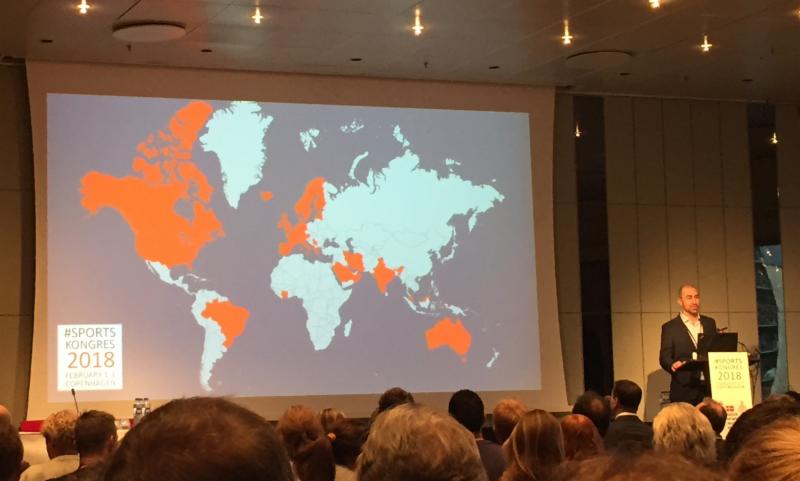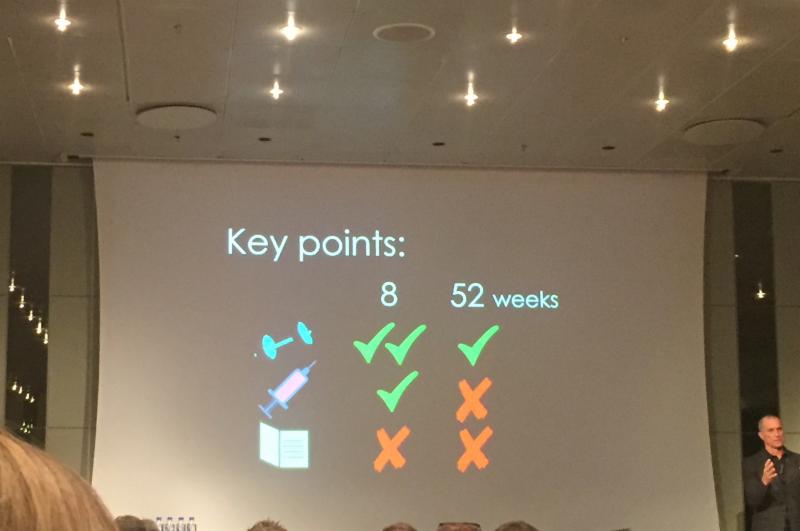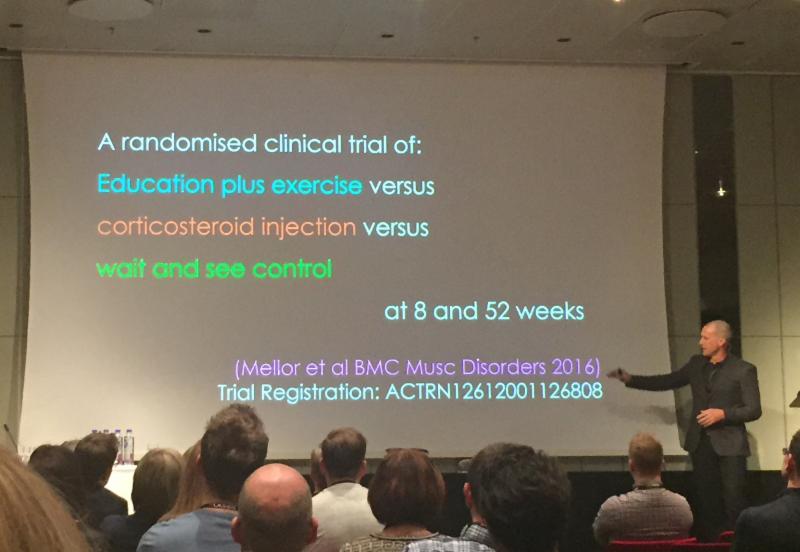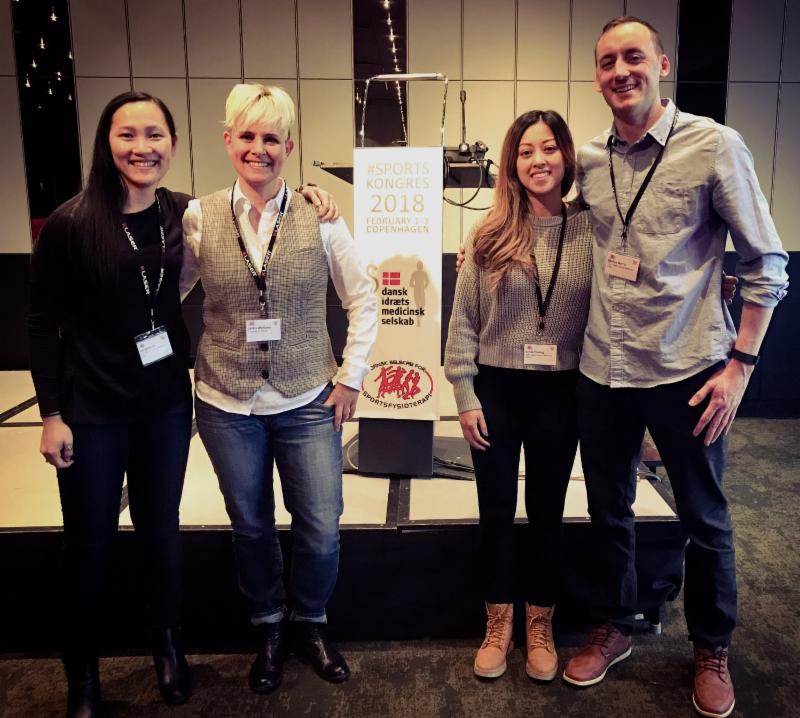Christina Le, Physiotherapist and PhD student from Glen Sather Sports Medicine Clinic, Edmonton, Canada, created a blog post about Sport Kongres 2018 in Copenhagen, Denmark. For those who were unable to attend, her blog gives a concise look at one of the most well-known sport congresses internationally.

Are you seeking more knowledge? Are you seeking more fun? Look no further than Sports Kongres
! Hosted in the lovely city of Copenhagen, this year's edition featured 700 researchers and clinicians from all over the world, making it the largest sports conference ever held in Denmark! This conference should be on the bucket list for all sport physical therapists.
If you were there in person, read on to relive the glory! If you weren't there, what are you waiting for? Check out some of the top messages from Sports Kongres 2018!
Dr. Keith Baar: chatting collagen and cross-links!
Keith's keynote kicked off the conference by digging deep into connective tissue. It might not the sexiest topic but it's crucial to understand the molecules behind our movement. He pointed out that two things make our tissues stronger: collagen and cross-links.
Specifically in tendons, collagen and cross-link function variesby region. This means the part closer to the muscle should be more mobile and the part closer to the bone should be more rigid. In other words, at the myotendinous junction (MTJ), there is a shearing force which causes cross-links to break and the tendon to be more extensible. At the bony insertion, there is minimal shearing and minimal cross-link breakdown which leads to a stiff tendon region. Balancing these two dynamics should lead to a well-functioning tendon unit.
From some animal and in vitro studies, Keith also suggested that short periods of activity (5-10 minutes) followed by long periods of rest (6 hours) might be the key to optimizing connective tissue health. Well go on then, test it out!

Bill Vincenzino presents at the Sports Kongres.

Dr. Chris Bleakley: calling the POLICE!
Ask physios, doctors, or even patients what to do after they sprain their ankle. Everyone rattles off protection, rest, ice, compression, and elevate - PRICE! Chris gave us a great overview of the literature supporting all the components of PRICE. And, I hate to break it to you but the price ain't right.
Did you know we've been applying ice for 2000 years yet there are only 9 RCTs looking at its effectiveness? Needless to say, ice, compression, and elevation have varying levels of evidence. Rest, on the other hand, may need to take a permanent seat on the bench.
Enter optimal loading! This doesn't mean forget about tissue healing timelines. Optimal loading implies loading to whatever extent you are comfortable with and whatever is safe. Finding the right balance between rest and load is key! So, the next time you're dealing with an acute injury, go call the POLICE!
Dr. Jasper Schipperijn: using GPS to inform physical activity intervention!
I will fully admit my bias here. Physical activity, particularly in youth, has been an area that I've become more interested in since starting my PhD. So this presentation wowed me. Jasper has cleverly combined GPS, accelerometer, and GIS data to measure physical activity trends and behaviours in school children. Watch this quick video demonstration
on how Jasper's lab tracks school children's activity throughout the day:
He found that these school children from Copenhagen received roughly 20% of their activity from transport. That is, going from home to school or school to the football pitch is a simple way to get the heart pumping and rack up physical activity minutes. I'm looking forward to seeing how Jasper's team will utilize this data to inform future physical activity interventions!
Jack Hickey: rehabbing hamstrings through pain!
In a brief 10-minute presentation, Jack hit us with RCT findings on hamstring rehabilitation with and without a pain tolerance threshold. How cautious should we be with self-reported pain after a hamstring strain? Well Jack's RCT separated 43 participants into two treatment arms: one where no pain was tolerated during exercise progression (i.e. pain-free group) and one where 4/10 pain was tolerated (i.e. pain-threshold group).
There was no significant difference in time to return to sport between the pain-free and pain-threshold group. The morale of the story is that you don't have to completely avoid pain during hamstring strain rehabilitation, a little bit is okay!
Katja Heinemeier: dropping bombs on tendon turnover!
Cleverly using the atmospheric spike in carbon-14 during the Cold War, Katja discovered that tendon tissues aren't quick to turnover like muscles. The collagen in tendons is formed while you are growing and stays with you throughout life. The final conclusion straight from Katja's slides: "healthy tendon has very limited turnover after its initial formation." What you're born with is what you get! So treat your tendons with the respect they deserve. I hope this blew your mind.
And that's a wrap! Five of my favourite take home messages from Sports Kongres 2018! Before I sign off, I would like to highlight the oral presentations competition. IFSPT vice president Kristian Thorborg introduced it as the Wimbledon of sport medicine research - a very high standard! It didn't disappoint and, in retrospect, was probably my favourite segment of the conference. From a massive field of 140 submitted abstracts (including mine, sigh), the top 6 were selected for oral presentations. These were quality presentations but included data that has not been officially published hence I was unable to include them in my top messages. Keep an eye out for:
- Anders Boesen (and family): High-volume injection with and without corticosteroid in chronic midportion Achilles tendinopathy (3rd place)
- Joar Harøy: The preventive effect of an adductor strengthening programme on groin problems among male football players (2nd pace)
- Nynke Swart: Magnetic resonance imaging in general practice for patients with traumatic knee complaints
- Anne-Sofie Agergaard: Achilles tendon elongation after surgical repair regardless of loading
- Bill Vicenzino: Education plus exercise, corticosteroid injection, or control for gluteal tendinopathy (Winner!)
- Evi Wezenbeek: The role of vascular and structural response to activity in the development of Achilles tendinopathy
As a final note, I highly encourage everyone to do two things. The first is sign up for Twitter because it is an amazing way to network and make friends from around the world. It was incredible to meet some of my "Twiends" from all parts of the globe! The second is book your trip to Copenhagen for January 31 to February 2, 2019. Sports Kongres boasts an incredible lineup of brilliant researchers and clinicians and also provides an opportunity to mingle with these bright minds over a Carlsberg (or two... or five). Don't forget to pack your notebook, your external battery, and (of course) your dancing shoes!
- Christina (
@yegphysio
)
P.S. Shoutout to Jackie Whittaker, Linda Truong, and Declan Norris whose wisdom, support, and laughter has helped me get to where I am today. The Faculty of Rehabilitation at the University of Alberta and the Glen Sather Sports Medicine Clinic were well represented!

Christina Le, Jackie Whittaker, Linda Truong, and Declan Norris.